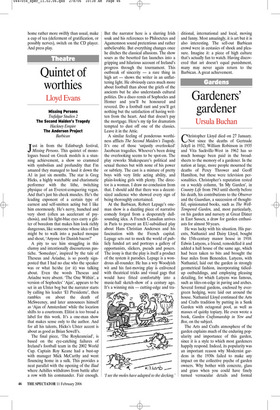Quintet of worthies
Lloyd Evans
Missing Persons Trafalgar Studios 2 The Second Maiden’s Tragedy Hackney Empire The Andersen Project Barbican Just in from the Edinburgh festival, Missing Persons. This quintet of monologues based on Greek models is a stunning achievement, a show so crammed with symbolism and profundity that I’m amazed they managed to haul it down the A1 in just six months. The star is Greg Hicks, a highly watchable and charismatic performer with the lithe, twitching physique of an Everest-conquering vegan. And that’s just his cheek muscles. He’s the leading exponent of a certain type of earnest and self-smitten acting but I like him enormously. He’s nervy, hunched and very short (often an accelerant of psychosis), and his light-blue eyes carry a glitter of boredom that makes him look richly dangerous, like someone whose idea of fun might be to walk into a packed mosque and shout, ‘Anyone for Danish bacon?’ A pity to see him struggling in this clumsy and intentionally discourteous pastiche. ‘Somedays’, inspired by the tale of Theseus and Ariadne, is so poorly signposted that I had no clue who the speaker was or what he/she (or it) was talking about. Even the words Theseus and Ariadne were absent. ‘The One Within’, a version of Sophocles’ ‘Ajax’, appears to be set in an Ulster bog but the narrator starts by calling his leader ‘El Presidente’, then rambles on about the death of McSweeney, and later announces himself as ‘Ajax of Amsterdam’ while the location shifts to a courtroom. Elitist is too broad a label for this work. It’s a one-man show that makes sense only to the author. And for all his talents, Hicks’s Ulster accent is about as good as Brian Sewell’s.
The final piece, ‘The Roykeaneiad’, is based on the eye-catching failures of Ireland’s football team in the 2002 World Cup. Captain Roy Keane had a bust-up with manager Mick McCarthy and went flouncing home in a sulk. This provides a neat parallel with the opening of the Iliad where Achilles withdraws from battle after a row with his commander. Fair enough. But the narrator here is a slurring Irish soak and his references to Philoctetes and Agamemnon sound pretentious and rather unbelievable. But everything changes once he ditches the classical allusions. The show soars as the besotted fan launches into a gripping and hilarious account of Ireland’s progress through the tournament. This outbreak of sincerity — a rare thing in high art — shows the writer in an unflattering light. He obviously cares much more about football than about the griefs of the ancients but he also understands cultural politics. Do a disco remix of Sophocles and Homer and you’ll be honoured and revered. Do a football rant and you’ll get nothing but the satisfaction of having written from the heart. And that doesn’t pay the mortgage. Here’s my tip for dramatists tempted to dust off one of the classics. Leave it in the Attic.
A similar feeling of ponderous worthiness afflicts The Second Maiden’s Tragedy. It’s one of those ‘unjustly overlooked’ Jacobean tragedies. Whoever’s been doing the overlooking seems to be spot-on. The play reworks Shakespeare’s political and sexual themes but with none of his power or subtlety. The cast is a mixture of pretty boys with very little acting ability, and plain-looking girls with plenty. The director is a woman. I draw no conclusion from that. I should add that there was a decentsized audience who showed every sign of being thoroughly entertained.
At the Barbican, Robert Lepage’s oneman show is a dazzling piece of narrative comedy forged from a desperately dullsounding idea. A French Canadian arrives in Paris to present an EU-subsidised play about Hans Christian Andersen and his fascination with the French capital. Lepage sets out to mock the world of publicly funded art and portrays a gallery of opportunists, slickers, pseuds and posers. The irony is that the play is itself a product of the system it parodies. Lepage is a wondrous all-rounder. He has a wry Woodyish wit and his fast-moving play is enlivened with theatrical tricks and visual gags that would have fitted comfortably into a music-hall sketch-show of a century ago. It’s a winning mix — cutting-edge and tra ditional, international and local, moving and funny. Most amazingly, it is art but it is also interesting. The sell-out Barbican crowd were in ecstasies of shock and pleasure. Imagine it: a piece of high culture that’s actually fun to watch. Having discovered that art doesn’t equal punishment, many may never again return to the Barbican. A great achievement.














































 Previous page
Previous page